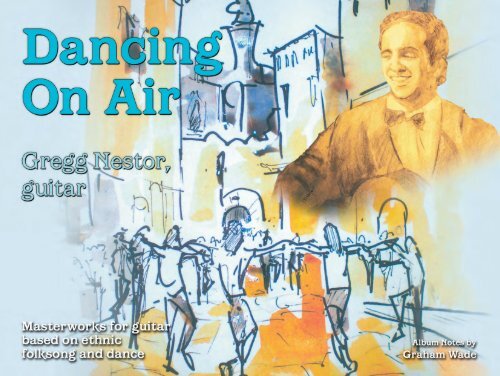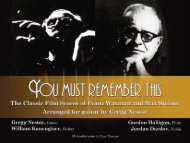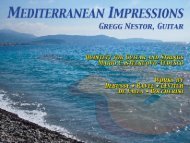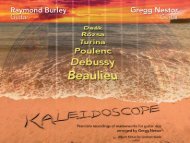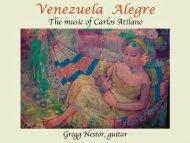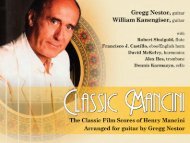Download Dancing On Air CD Full-Color Digital Booklet (PDF)
Download Dancing On Air CD Full-Color Digital Booklet (PDF)
Download Dancing On Air CD Full-Color Digital Booklet (PDF)
Create successful ePaper yourself
Turn your PDF publications into a flip-book with our unique Google optimized e-Paper software.
Album Produced by Gregg NestorRecorded at Penguin Recording, Eagle Rock, CABetween July and September, 1991Engineer: John Strother<strong>Digital</strong>ly Mastered byJonathan Marcus, Orpharion RecordingsAlbum Art Direction: Mark BanningMr. Nestor’s Guitar by José Ramirez, 1984Front cover drawing by Gary FriedmanPage six drawing by Mária Auerová-GriesováDedicated to my grandmothers Clara and Frieda,who instilled in me a lifelong love of music and homemade sweet rolls.
The guitar has long been associated withfolk music and composers over thecenturies have been indebted to folksongs. <strong>On</strong>e only has to think of Schubert,Liszt, Tchaikovsky, Bartók, Dvorák, VaughanWilliams, Rodrigo, etc., to realise the extentof this umbilical relationship between socalled “art” music and the folkloric. <strong>On</strong> thisrecording the two cultural streams, that offolk and the other of the concert hall, arejuxtaposed, some of the pieces beingstraightforwardly “folk”, the rest examples ofhow contemporary composers haveenthusiastically used the resources of theirnational heritage.Gregg Nestor’s arrangements of Hebrewfolksongs are a rich reminder of thegenerations of anonymous musicians whosecreativity endures in a wealth of traditionalworks. The Hebraic Suite (1983) comprisessongs that were rooted in everyday living,centered around the Rabbi, the hearth,parents, and the dance, etc., music and dailyroutines being inextricably intertwined.Here the emphasis is on community life andfamily relationships, though dance rhythmsand religious cadences are never far away.Alexandre Tansman(1897-1986), one of thetwentieth century’sleading Polishcomposers, resided inParis from 1920 onwardsuntil moving to theUnited States for thewar years. His worksinclude symphonies,concertos, stringquartets and a quantityof piano and film music.Tansman and Andrés Segovia first met in1925 at a musical soirée given in Paris byHenri Prunières. <strong>On</strong> hearing Segovia play,Tansman was converted to a lifelong love ofthe guitar and thereafter wrote a number ofworks for it.Concerning In Modo Polonico (In PolishMode) (1962), Tansman wrote: “I have beenfascinated by Andrés Segovia’s musicalpersonality since the first contact I had withhis art, and I am proud to have been amongthe first young composers to have composeda work for him. This suite is inspired by theancient court dances of Poland. Some ofthem, the Gaillarde, the Branle, havecounterparts elsewhere in Europe. Others aretypically Polish (the Polonaise, the Mazurka).The subject has been treated in a languagewhich seems to me most suited for a workbased on national or traditional forms – thatis I have avoided any voluntary stylization ormodernization which, if adapted to the puremelodic lines, the popular harmonic style,and rhythmic meters, would result insomething artificial and hybrid.”Among these dances the Kujawiak is a formof Mazurka originating in the Kujawydistrict near Warsaw, while the Oberek, is atype of faster Mazurka, a dance in three-fourtime characterised by a strong accent in themiddle of the measure. The Kolysanka is alullaby, a recurrent theme in folk music of allcountries. The Polonaise, like the Mazurka,for ever made famous by the genius ofChopin, began as a folk dance, in triplemetre, played at weddings and festivals, andwas later transformed into a moresophisticated dance appropriate for the courtand the ballroom.The traditional English folk songGreensleeves is a tune twice mentioned byShakespeare in The Merry Wives of Windsor.The first official reference to the piece was inthe Register of the Stationers Company in1580 where it was called “A New NorthernDittye of the Lady Greene Sleeves.” It issometimes alleged that Henry VIII wroteGreensleeves but scholarly opinion is againstthis.GREENSLEEVESAlas, my love, you do me wrong,To cast me off discourteously.For I have loved you well and long,Delighting in your company.[Chorus]Greensleeves was all my joyGreensleeves was my delight,Greensleeves was my heart of gold,And who but my lady Greensleeves.John W. Duarte (1919-2004), a prolificcomposer for guitar, was also a writer, criticand teacher, determined to elevate thestandards of the instrument to which he haddedicated his life. He was particularlyinterested in folksongs, often incorporatingthem into his compositions but by no means
confining himselfmerely to thosefrom his owncountry. HisEnglish Suite, Op.31, undoubtedlyhis mostperformed work,written 1963/1965,was dedicated toAndrés Segoviaand his wife on theoccasion of theirmarriage. Originally the opening movementwas part of a group of “fairy tale” pieces asrepresented in piano works under that titleby Medtner. Segovia suggested that thisconcept should be expanded into a suitebased on folk music but ultimately Duartedecided to integrate his own material andfolk themes. Thus the Prelude begins with a“fairy tale” section before leading into theSussex song, Low down in the Broom andreturning to the original melody. The secondmovement, Folk Song, opens with TheCuckoo from Somerset, while in RoundDance the central section is the song, TheBallad of Robin Hood.The Londonderry <strong>Air</strong>, the most evocative andbest loved of all Irish folk songs, was firstfound in print in a collection edited byGeorge Petrie, The Ancient Music of Ireland,(1855). It was given to Petrie by Miss JaneRoss of Limavady, who took down tunesfrom the peasants who came totown on market days. The song wasdescribed as an anonymous air andattributed incorrectly to Jane Ross ofLondonderry, which led to the titleLondonderry <strong>Air</strong> being associated with thepiece.A number of lyrics have been set to thismelody but the most popular is Oh DannyBoy, written in 1910 by Frederick EdwardWeatherly, an English lawyer. This has beenuniversally adopted as a poignant anthemsung with passion wherever Irish people aregathered:OH DANNY BOYOh Danny boy, the pipes,the pipes are callingFrom glen to glen,and down the mountain sideThe summer's gone,and all the flowers are dying'Tis you, 'tis you must go and I must bide.But come ye back whensummer's in the meadowOr when the valley's hushedand white with snow'Tis I'll be here in sunshine or in shadowOh Danny boy, oh Danny boy,I love you so.And if you come,when all the flowers are dyingAnd I am dead, as dead I well may beYou'll come and find the placewhere I am lyingAnd kneel and say an “Ave” there for me.And I shall hear,though soft you tread above meAnd all my dreams will warmand sweeter beIf you'll not fail to tell methat you love meI'll simply sleep in peaceuntil you come to me.Suite Piemontese, Op.46 (1970) by John W.Duarte was described by the composer as“written for composer/guitarist AngeloGilardino and based on folk-tunes fromPiemonte, the region of his birth”. The firstmovement, Pastorale, celebrates Il pastorfedele, the faithful shepherd, “the sounds ofwhose pipes or of nearby birds are heard”.The second movement, Canzona, is based ona tune which Gilardino remembered fromhis youth, the counter-melody to its secondstatement developing into the theme of thecentral section. Finally La Danza provides anepisode poking mild fun at a typical villageband which plays out of tune.Eduardo Sáinz de laMaza (1903-1982),brother of the guitaristRegino Sáinz de laMaza for whomRodrigo’s famousConcierto de Aranjuezwas composed, firststudied the guitar inMadrid with DanielFortea (1878-1953), andlater with MiguelLlobet (1878-1938),both former pupils of the great FranciscoTárrega (1852-1909). Though lessinternationally famous than Regino,Eduardo Sáinz de la Maza emerged as amuch loved composer whose warmly poeticguitar works evoke many moods of Spanishlife. Habañera is a characteristically lyricaltribute to Cuba, a country rich in folk musicthat is both rhythmic and melodic.Finally Duarte’s Variations on a Catalan FolkSong, Op. 25 (1956), was written for and onthe suggestion of guitarist John Williams.The theme is from Miguel Llobet’s superbarrangement of Cançó de lladre (TheRobber’s Song), one of the great collection oftraditional folk pieces from Cataloniacharacterised by beautifully poetic verses.
Duarte described these variations as“virtuosic”, exploiting “a variety of texturesand moods”.The tonics of the keys of the variations, D-E-F#-F-E-A-D follow the sequence of the bassline in Llobet’s setting of the melody.GRAHAM WADEMarch, 2009Graham Wade, a graduateof Jesus College,Cambridge, and formerlyHead of Strings at LeedsCollege of Music, isacknowledged as one ofthe foremostinternational writers onclassical guitar. Hispublications include highly acclaimedstudies of Segovia, Rodrigo, and Bream, aswell as books on guitar history. He haswritten liner notes for record companiessuch as Deutsche Grammophon, EMI,Naxos, and RCA, and conducted guitarseminars at conservatoires and festivals inthe USA, Canada, Spain, Austria, Germany,Norway, Sweden, Holland, Hungary, Greece,Czech Republic, New Zealand, etc. In 2002he was awarded the Schott Gold Medal forhis contribution to Rodrigo studies. GrahamWade is an Advisory Editor for British andAmerican editions of the New GroveDictionary of Music and for many yearswrote programme notes for Segovia andBream.
<strong>Dancing</strong> <strong>On</strong> <strong>Air</strong>Gregg Nestor, guitarMasterworks for guitar based on ethnic folksong and danceHEBRAIC SUITE arranged by Gregg Nestor01. The Rabbi Wants Us to be Merry 1:5002. A Flame Is Burning 2:4903. A Letter to Mother 1:5504. Hassidic Dance 1:4505. My Yiddische Momma 1:5606. Inconsolable 2:3107. Chave! 1:39SUITE IN MODO POLONICOAlexandre Tansman08. Branle (Entrée) 2:5109. Gaillarde 1:0510. Kujawiak (Mazurka Lente) 2:3511. Tempo de Polonaise 1:4012. Kolysanka No. 1 3:3213. Mazurka 3:1614. Reverie 2:3615. Alla Polacca 2:1916. Kolysanka No. 2 2:1117. Oberek (Mazurka Vive) 2:3718. GREENSLEEVESarranged by John Duarte 2:00ENGLISH SUITE, Op. 31 John Duarte19. Prelude 2:3120. Folk Song 3:3721. Round Dance 1:5622. IRISH TUNE-THE LONDONDERRY AIRarranged by Gregg Nestor 2:26SUITE PIEMONTESE, Op. 46 John Duarte23. Pastorale 3:2924. Canzona 3:5525. La Danza 2:3126. HABAÑERA Eduardo Sáinz de la Maza 3:0827. VARIATIONS ON A CATALAN SONG, Op. 25 John Duarte10:31Theme - Resoluto - Molto lirico -Vivo e con forza - Alla Sarabanda -Con bravura - Con delicatezza - FinaleTT= 75:20 2012 Gregg Nestor. All Rights Reserved.Released by BSX Records, a division of Buysoundtrax.com • 2828 Cochran Street #287, Simi Valley, California 93065


